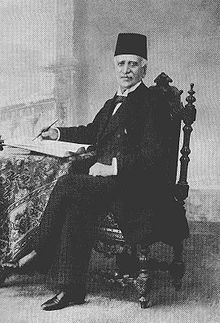
Mirza Malkam Khan
Encyclopedia

Iranian Constitutional Revolution
The Persian Constitutional Revolution or Iranian Constitutional Revolution took place between 1905 and 1907...
.
Malkam Khan was born to an Armenian
Armenians
Armenian people or Armenians are a nation and ethnic group native to the Armenian Highland.The largest concentration is in Armenia having a nearly-homogeneous population with 97.9% or 3,145,354 being ethnic Armenian....
Christian
Christianity
Christianity is a monotheistic religion based on the life and teachings of Jesus as presented in canonical gospels and other New Testament writings...
family in Persia and educated at the Samuel Muradian school in Paris from 1843–51. He later returned to Persia, converted to Islam
Islam
Islam . The most common are and . : Arabic pronunciation varies regionally. The first vowel ranges from ~~. The second vowel ranges from ~~~...
, and entered government service. He was elected as instructor at the newly established Tehran Polytechnic, Dar ul-Funun, in 1852. He went to Paris in the diplomatic service in 1857.
Malkom Khan introduced societies similar to the Freemasons in Persia in 1859, and was exiled by Nasser ad-Din Shah
Nasser al-Din Shah
Nasser al-Din Shah Qajar was the King of Iran from September 17, 1848 to May 1, 1896 when he was assassinated. He was the son of Mohammad Shah Qajar and Malek Jahan Khanom, Mahd-e Olia and the third longest reigning monarch king in Iranian history after Shapur II of the Sassanid Dynasty and...
for doing so in 1862. He was later pardoned and given a post at the embassy in Constantinople
Constantinople
Constantinople was the capital of the Roman, Eastern Roman, Byzantine, Latin, and Ottoman Empires. Throughout most of the Middle Ages, Constantinople was Europe's largest and wealthiest city.-Names:...
. He returned to Tehran
Tehran
Tehran , sometimes spelled Teheran, is the capital of Iran and Tehran Province. With an estimated population of 8,429,807; it is also Iran's largest urban area and city, one of the largest cities in Western Asia, and is the world's 19th largest city.In the 20th century, Tehran was subject to...
in 1872 as assistant to Grand Vizier Mirza Hasan Khan Pirnia, Moshir od-Dowleh, and became the chief of the Persian legation in London (and later ambassador) in 1872. He remained in the position until 1888, and lost his position in 1889 as the result of a scandal over selling a cancelled concession for a lottery.
From London, Malkam Khan attacked both the shah and Persian government, and edited the news-sheet Qanun, which was banned in Persia but read by the shah and his ministers. Malkam Khan eventually became recognised as the most important Persian moderniser of the century, and he was later pardoned and reinstated as ambassador to Italy
Italy
Italy , officially the Italian Republic languages]] under the European Charter for Regional or Minority Languages. In each of these, Italy's official name is as follows:;;;;;;;;), is a unitary parliamentary republic in South-Central Europe. To the north it borders France, Switzerland, Austria and...
by Mozaffar ad-Din Shah in 1898 with the title of Nezam od-Dowleh. He remained ambassador to Italy until his death in 1908.
Further reading
- Mehrdad Kia, Pan-Islamism in Late Nineteenth-Century Iran, Middle Eastern Studies, Vol. 32, No. 1, pp. 30-52 (1996).

